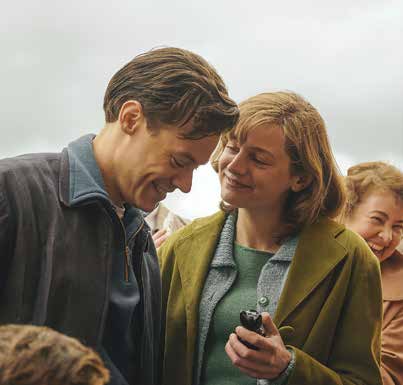
By Gary M. Kramer–
The fusty British drama, My Policeman, opening in theaters October 21 and available on Prime Video November 4,recounts the love triangle that develops between characters Tom, Marion, and Patrick in 1957 Brighton as well as four decades later. The film, helmed by out director Michael Grandage, and written by gay screenwriter Ron Nyswaner, who adapted Bethan Roberts’ book, comes off as both stuffy and a bit stagey. Most of the action has the characters behaving politely—or not—in well-appointed rooms as they stifle their real feelings.

As the film opens in the 1990s, Patrick (Rupert Everett) is arriving at the home where Marion (Gina McKee) and her husband Tom (Linus Roache) are living. Patrick has had a stroke and requires care, which Marion agrees to provide, but Tom refuses to acknowledge their guest. The tension between Marion and her husband as well as between Tom and Patrick triggers painful memories for all. Moreover, Marion finds Patrick’s diaries among his personal effects, and sets about reading them, which leads to extended flashbacks from when they all first met in 1957.
My Policeman shows how Tom (Harry Styles) meets Marion (nonbinary Emma Corrin). He teaches her how to swim; she teaches him culture. But it eventually becomes clear that Tom’s interest in books, art, and music (opera) is really his way of being with their influential friend Patrick (out David Dawson), who works at the local museum and is—gasp—eventually revealed to be a homosexual.

Scenes depicting Patrick sketching Tom lead to a cozy moment that soon turns erotic. While Tom tries to deny his same-sex longings, he returns to Patrick’s apartment for more sex, and the guys share a secret love affair. And if anyone needs a reminder of how dangerous it was to be gay back in 1957 Britain—when it was a crime—the film includes a scene of Patrick picking up a gentleman in an underground bar and running from the police when they are caught in an alley about to have sex.
While Patrick tries to protect himself, My Policeman shows how Tom struggles. He proposes to Marion in a bid for “normalcy,” but still cannot resist being with Patrick. When Patrick pays Tom to accompany him on a trip to Venice—so they can be together without Tom having to go back to work or his wife—it practically telegraphs how Marion will react.
Herein lies the problem with My Policeman. Like Tom who tries to please both his lovers—but ends up pleasing neither—the film tries to create something romantic and tragic but ends up being neither. The passion between Tom and Patrick is certainly greater than Tom’s love for Marion. The sex between the men is sensual, and the film will certainly please viewers who want to see Styles naked, kissing men, and in the throes of same-sex ecstasy. In contrast, Tom consummating his marriage with Marion is stiff and awkward for him, her, and viewers.

And while Styles is certainly attractive enough to catch the eyes of both genders here, as an actor, his performance is pretty uneven. (He is best when he keeps his mouth shut, as when he’s posing for Patrick.) He never quite convinces as a man lovesick for his friend, yet watching the two guys hold hands discretely during a musical performance, or when they are walking along a coastline, is sweet. However, an outburst Tom has about Patrick not knowing about children—which is really him expressing his own self-loathing—is almost risible.
Corrin, too, seems miscast. She is appropriately innocent until she puzzles out what her husband and his best friend are up to together. (A scene of her spying on them is necessary, perhaps, but it feels so contrived.) And while her anger at being betrayed by both men, whom she insists want to destroy her marriage, is justified, how she processes things—that homosexuality is “unnatural”—seems to be a knee-jerk reaction/rejection rather than something she truly believes.

Dawson is best as the effete Patrick. He is a natty dresser and has a panache that is appealing to both Tom and Marion—until it isn’t. But he is the most truthful character in the film, which is why he gains the most sympathy, and Dawson plays him as both romantic and tragic, which is why his performance shines. Styles broods sexily, Corrin broods with indignation, but Dawson only broods when Patrick is separated from Tom.
The scenes set in the 1990s are not much better. (The toggling back and forth between time periods also undercuts the power of the story.) Marion and Tom both brood, and Patrick, who can barely talk, just wants a cigarette. The bickering between Marion and Tom comes off as forced. There is just not enough investment in these characters 40 years later to make their emotions resonate.
When Tom spies a gay couple in town, he rushes to his car to cry, perhaps regretting what his life could have been. But My Policeman fails to jerk tears, despite one character’s declaration that all love stories are tragic. What is unfortunate about this film is that it so bland; it could have been so much better.
© 2022 Gary M. Kramer
Gary M. Kramer is the author of “Independent Queer Cinema: Reviews and Interviews,” and the co-editor of “Directory of World Cinema: Argentina.” Follow him on Twitter @garymkramer
Film
Published on October 20, 2022








